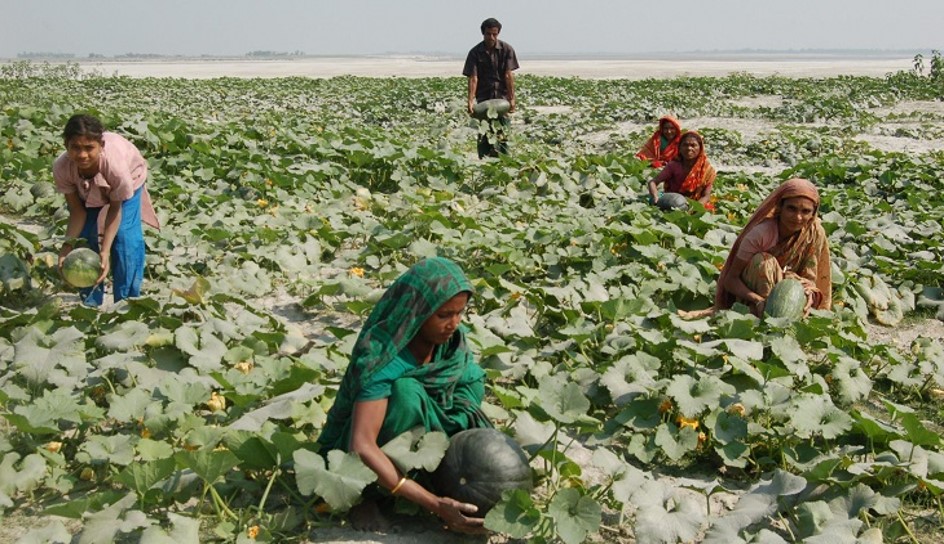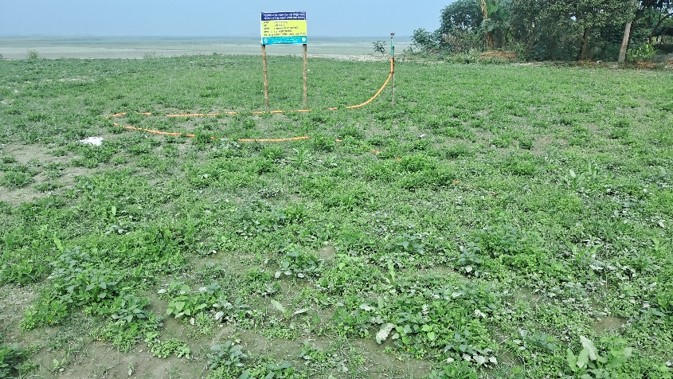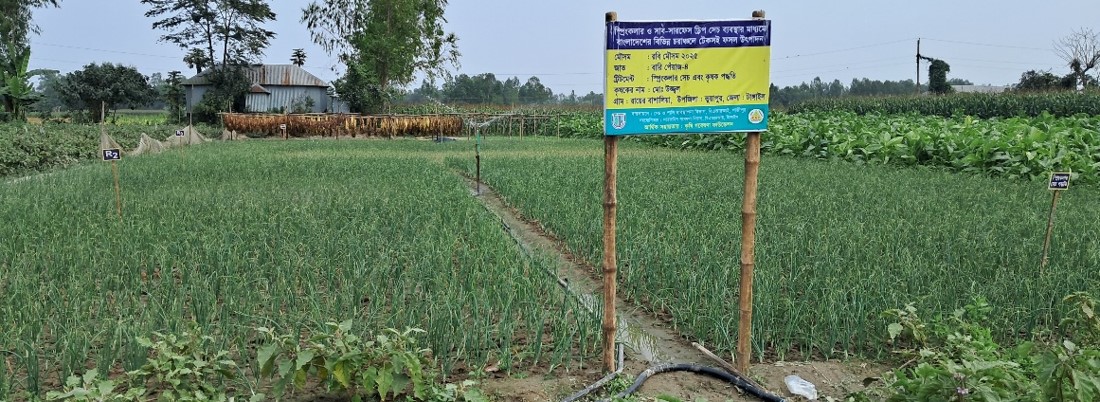Validating and Refining Sprinkler and Subsurface Drip Irrigation Systems for Sustainable Crop Production in Different Char Areas of Bangladesh
Efficient micro-irrigation improves crop yields while conserving water. This study promotes sustainable agriculture and better livelihoods in Bangladesh’s char regions by advancing micro-irrigation systems. First-year trials were conducted in the char lands of Manikganj, Rajbari, and Tangail and evaluated sprinkler and subsurface drip irrigation (SDI) systems on various crops like brinjal, onion, garlic, groundnut, and pumpkin. Results showed increased yields and significant water savings, highlighting these technologies' potential for sustainable farming in char regions.
This project included field surveys, site and farmer selection in Bangladesh’s char areas to refine sprinkler and SDI systems. Experiments with brinjal, chili, and pumpkin compared drip and subsurface drip irrigation methods with farmers’ practices, while sprinkler systems were tested for onion, groundnut, and garlic. The sprinkler irrigation method was also compared with farmers’ practices. Standard agronomic and plant protection practices were maintained throughout to ensure optimal crop growth.
The adoption of sprinkler and SDI in Bangladesh’s char areas improved crop yields and water efficiency. Onion yield at Kalukhali increased from 17.26 t/ha (farmers’ practice) to 20.74 t/ha (sprinkler), with 13.48% water savings. Brinjal at Kalukhali under SDI achieved water productivity of 13.14 kg/m³ with 43.61% water savings. Garlic at Harirampur improved from 6.11 t/ha (farmers’ practice) to 7.89 t/ha (sprinkler), saving 10.62% water. Pumpkin at Harirampur under SDI required 163 mm of water, yielding 36.80 t/ha with 33.47% water savings. Overall, modern irrigation technologies enhanced crop productivity and minimized water use in vulnerable regions.
The project’s first year demonstrated the potential of sprinkler and SDI to enhance crop productivity on Bangladesh’s char lands. Validation trials in 2023–2024 showed an average water savings of approximately 15% to 40% and an average yield increase of approximately 5% to 30%, depending on the crops and technologies used. By strengthening farmer linkages and research collaborations, these technologies provide a sustainable approach to improving food security and resource efficiency in vulnerable regions.
By adopting advanced irrigation systems, such as sprinkler and SDI, farmers have harvested higher crop yields with less water leading to higher incomes for them. The farmers associated with the project have been/will be trained in the utilization of the two water-saving irrigation systems so that at the end of the project they will adopt the irrigation systems. Additionally, the project has connected farmers with local markets and research institutions, fostering better access to agricultural advice and resources. New value chain linkage will be established, allowing farmers to sell their products more efficiently. By adoption of the irrigation systems the overall agricultural economy in the char regions will be improved.
At the end of the project, the participating farmers will develop their valuable skills in managing modern irrigation systems like sprinklers and SDI. They will become able to maintain and repair the systems independently, which ensures their continued use. Other farmers of the community will learn about the irrigation systems by knowledge sharing, creating a network of support for ongoing learning and implementation. This peer-to-peer approach helps spread the benefits of the irrigation technology across more areas. The community’s ongoing commitment to the project’s principles and practices helps sustain its impact even without additional funding.
Through hands-on training in advanced irrigation techniques: sprinkler and SDI, farmers will gain valuable skills in managing water more efficiently and boosting crop yields. These new skills help farmers to become more confident and self-reliant in their agricultural practices. The project will assist farmers to connect with the financial institutions, helping them access loans or subsidies to invest in better irrigation technologies and develop entrepreneurship as service providers. These efforts will empower local farmers and strengthen agribusinesses.



